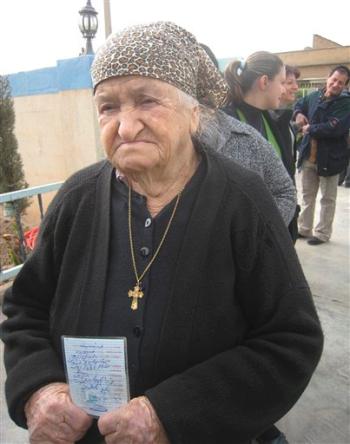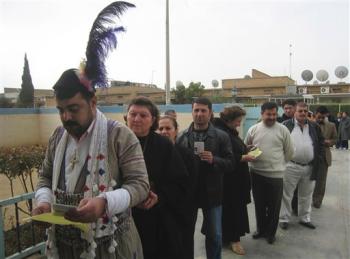

 MOSUL, Iraq (AP) -- Iraqi Christians still reeling from a string of murders last fall find themselves caught in the middle of a power struggle between Kurds and Sunni Arabs that was fueled by this weekend's elections.
MOSUL, Iraq (AP) -- Iraqi Christians still reeling from a string of murders last fall find themselves caught in the middle of a power struggle between Kurds and Sunni Arabs that was fueled by this weekend's elections.
The minority community has faced years of violence and intimidation from al-Qaida in Iraq and other Islamic extremists. In the northern city of Mosul and surrounding areas, many also fear the Kurds want incorporate parts of the area into their semiautonomous region in northern Iraq.
The issue came to the fore in Saturday's vote for members of ruling councils in most of Iraq's 18 provinces. Results are not expected for days or even weeks.
But when the votes are finally counted, Kurds are expected to lose the dominance they have enjoyed here in Ninevah province since Sunni Arabs boycotted the last provincial election in 2005.
Christians will get at least one out of 37 council seats in the province, thanks to a minority quota. But many Christians are divided about whether to back the Kurds or the Sunni Arabs in their struggle for domination in Ninevah and its capital city of Mosul.
The U.S. military believes continued Kurdish-Arab tension in the north poses one of the strongest challenges to ensuring long-lasting peace in Iraq now that Shiite-Sunni violence has ebbed.
Fewer than 3 percent of Iraq's 26 million people are Christians, many concentrated in Ninevah province.
Raad Shaya, a 30-year-old Christian teacher who lives in the outlying town of Batnaya, said Christians face intimidation from both sides.
Islamic extremists recently threatened him and several Christian colleagues by placing a warning inside the minibus they used to commute to work.
"The Kurds are controlling the Christians right now," he said, lowering his voice after casting his ballot on Saturday. "There's also the threat from outside Islamic political parties."
"We're not targeted because we're Christian but because we're a minority in the middle of everything," he added.
Fears spiked in the fall with a string of murders of Christians in Mosul, driving thousands of Christian families to leave their homes for the safety of Christian villages around the city. Most have drifted back but are still afraid.
 "It's better at this point but we paid a high price for it," said Bassem Bello, the Christian mayor of Tel Kaif, a mixed Sunni Arab-Christian town near Mosul. "We're working very hard to make sure it doesn't happen again."
"It's better at this point but we paid a high price for it," said Bassem Bello, the Christian mayor of Tel Kaif, a mixed Sunni Arab-Christian town near Mosul. "We're working very hard to make sure it doesn't happen again."
He declined to say who was behind the attacks, which claimed up to 16 lives by some counts. But he said the outgoing provincial council had failed to protect its people.
"Whenever something like this happens we lose families. They go abroad. This is the agenda. They want the original people of this country to leave," he said. "They have certain aspirations to take over what the Christians have in their areas. Also there are extremist Islamic groups."
The Kurds already have moved to stake their claim on the nearby hilly area known as the Ninevah Plains by establishing checkpoints manned by well-trained Kurdish security forces known as peshmerga.
The sunshine flag of the semiautonomous Kurdish region to the north also flies on the top of several buildings in the villages and towns that comprise the areas, including some of the schools that were used as polling stations on Saturday.
A U.S. official said Christians need the peshmerga for protection but most have stayed on the fence because they're afraid of choosing the losing side. He spoke on condition of anonymity because of the sensitivity of the issue.
Although the Kurds are expected to lose seats, they are hoping for a strong showing as a measure of support for their claims to disputed areas of Ninevah.
The Kurds also are seeking to incorporate the oil-rich city of Kirkuk in another province into their semiautonomous area, but the vote for a council there was delayed until later this year.
Christians have frequently been targeted since turmoil swept the country after the 2003 U.S.-led invasion, although the attacks have ebbed with a sharp drop in overall violence.
Churches, priests and businesses of the generally prosperous, well-educated community have been attacked by militants who denounce Christians as pro-American "crusaders." The body of Paulos Rahho, the Chaldean Catholic archbishop of Mosul, also was found in March following his abduction by gunmen after a Mass.
Suvara Shamsun Haroun, a 25-year-old Christian woman who voted Saturday in Tel Kaif, pointed out that insurgents target all Iraqis "but sometimes they try to drive a wedge between the Arabs and the Christians."
Her mother Wirgania Shamwell expressed hope the Christian candidate chosen would help improve the situation.
"Hopefully the elections will bring security and a better future for Iraq and that's all we can hope for," she said. "Security is the main thing."
By Kim Gamel

or register to post a comment.